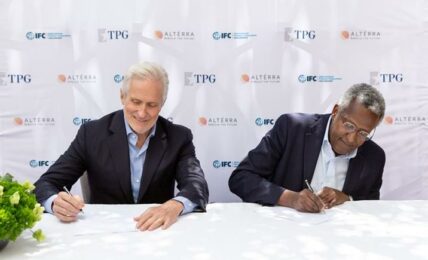Lufthansa Group announced that it will deploy AeroSHARK, a new surface film technology, on Lufthansa Cargo’s entire freighter fleet, resulting in fuel savings and emission reductions.
AeroSHARK was developed by aviation maintenance, repair and overhaul (MRO) provider Lufthansa Technik and chemicals and materials company BASF. The surface film mimics the fine structure of a shark’s skin, with a structure consisting of riblets measuring around 50 micrometers, resulting in optimized aerodynamics on flow-related parts of the aircraft.
Christina Foerster, Member of the Executive Board of Deutsche Lufthansa AG with responsibility for sustainability, said:
“Responsibility for the environment and society is a key strategic topic for us. We have always played a leading role in introducing environmentally friendly technologies. The new sharkskin technology for aircraft shows what strong and highly innovative partners can achieve collectively for the environment. This will help us to achieve our goal of climate neutrality by 2050.”
Air transport has come under increasing scrutiny in recent years as a significant contributor to GHG emissions. According to European Commission estimates, aviation accounts for 2% of global GHG emissions. Without efficiency improvements, aviation emissions are likely to increase along with the steady rise in air travel expected over the next several decades. Industry participants and associations have launched numerous initiatives to address aviation’s impact, targeting areas including improvements in aircraft and engine technologies, use of sustainable aviation fuels (SAF), implementing economic measures such as emissions trading and offsetting schemes, and improvements in air traffic management and aircraft operations.
Dr. Markus Kamieth, Member of the Board of Executive Directors of BASF, said:
“The aviation industry is facing similar challenges to the chemical industry: ongoing progress must be made with climate protection despite high energy requirements. By collaborating closely and successfully combining our know-how in surface design and aerodynamics, we have now succeeded in taking a major step forward. This is an excellent example of sustainability in practice, achieved through partnership-based collaboration and innovative technologies.”
According to Lufthansa Technik, the drag reduction from the new surface film will result in estimated annual savings of around 3,700 tons of kerosene and just under 11,700 tons of CO2 emissions when deployed on Lufthansa Cargo’s Boeing 777F freighter fleet.
Dr. Johannes Bussmann, Chief Executive Officer of Lufthansa Technik AG said:
“We have always used our wealth of expertise as a global market leader in technical aircraft services to also contribute to reducing the ecological footprint of our industry. In doing so, we can leverage significant savings potential from all aircraft generations. I am therefore very proud that we will soon be able to transfer the positive findings of the validation phase into the series application with Lufthansa Cargo. The extremely constructive collaboration with BASF is also the best example of cross-sector cooperation in the interest of the sustainability of the aviation industry.”
Dorothea von Boxberg, Chief Executive Officer of Lufthansa Cargo AG, added:
“We are proud that we will now be able to operate our entire freighter fleet even more efficiently in the future thanks to sharkskin technology and reduce the carbon footprint of our modern fleet further. The investments we have made in rolling out AeroSHARK at Lufthansa Cargo consciously reaffirm our commitment to the United Nation’s sustainable development goal on climate action.”
The post Lufthansa and BASF Mimic Shark Skin to Improve Fuel Efficiency and Reduce Emissions appeared first on ESG Today.


